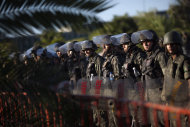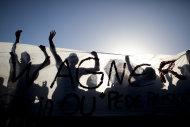SALVADOR, Brazil (AP) — About 300 striking police officers and their relatives held out Tuesday as soldiers blockaded a state legislature building in northeastern Brazil, and public worker leaders threatened a strike in Rio de Janeiro that could threaten the world's largest Carnival celebration.
About 1,000 soldiers and officers from an elite federal police unit ringed the legislature in the Bahia state capital of Salvador, Brazil's third-largest city with 2.7 million people and a scheduled host for matches during the 2014 World Cup.
Negotiations failed to end the strike in Salvador, officials said, and authorities in Rio de Janeiro also were preparing for police discontent there.
Officials put up protective fences and posted riot police around Rio's state legislature as lawmakers prepared to vote on a 39 percent raise for police, firefighters and prison guards, all of whom were threatening to strike Friday. The raise would increase an officer's starting salary to $964 a month.
Police, firefighters and others planned to meet Thursday to decide whether to start a strike that could cripple Rio's Carnival celebrations, which pump more than $500 million into the city's economy and attracts upward of 800,000 tourists.
Discontent among police is widespread across Brazil. Many officers complain of low pay and dangerous conditions in a country that recorded nearly 50,000 homicides in 2010.
In Salvador, the striking officers, some armed with handguns, were demanding pay raises and amnesty for what a judge ruled an illegal work stoppage.
Authorities said some children and wives of officers were inside the building, but it was not clear how many. Some left during the previous 24 hours.
Alcione Cruz, a 34-year-old maid, stood outside the legislature building, anxiously awaiting news from her husband, a police officer on strike.
"I'm praying to God that this situation will end and he'll come home," she said, declining to give her husband's name, fearing retribution from the government. "My husband is strong and courageous and I know he and others will stay until the very end."
About one-third of the 30,000 police in Bahia state went on strike a week ago, and murders in the capital's metropolitan area immediately spiked to double normal rates. Official say there have been at least 100 murders since Jan. 31, when the strike began.
But violence has lessened since some 2,000 troops and 600 elite federal police were sent in Sunday and began patrolling Salvador in armored personnel carriers.
Soldiers in camouflage and toting assault rifles are standing guard on street corners in the city's historic center and on its beaches, where tourists are concentrated. Schools were mostly shut, many businesses closed and streets were unusually empty.
While officials said some progress was being made in the negotiations in Salvador, no agreement was reached Tuesday. The key sticking point seemed to be the government's refusal to offer amnesty to union leaders behind the strike.
The strikers had narrowed their demands to amnesty for the walkout and payment of bonuses that would add about $350 a month to officers' paychecks. Monthly salaries for officers in Bahia now range between $1,100 and $1,330, depending on rank and experience.
The state government has offered a raise of 6.5 percent and no amnesty for the striking officers. A state judge last week ruled the strike illegal, saying striking officers who did not return to work would face fines of $45,000.
Jaques Wagner, the governor of Bahia state, has accused some of the striking officers of being behind the wave of violence that hit the city in the first days of the strike. He called it a "bloodbath" aimed at creating fear. Some striking officers were detained for allegedly organizing roving gangs and robbing police cars.
The standoff has hurt the economy of a city that hosts Brazil's second-largest Carnival celebration, set to open in 10 days. Several concerts were canceled last weekend because of fears about security.
Tourism officials from Bahia have denied rumors that the entire Carnival celebration will be canceled if the strike continues, but the Brazilian Association of Tourism Agencies said at least 10 percent of tourists planning to visit the city during Carnival already canceled their trips.
Federal Justice Minister Jose Cardozo has said Brazil's government could increase the number of soldiers and federal police in Bahia to 4,000 if necessary.
In Rio, Gov. Sergio Cabral said in a statement that he was confident Rio's police wouldn't strike.
"When they enter into these professions, they know they are doing an essential job," he said. "I have no doubt we will guarantee safety during Carnival and also in the day-to-day."
Since President Dilma Rousseff took office just over a year ago, police in four states have gone on strike. The newspaper Estado de S. Paulo says officers in eight more of Brazil's 26 states and federal district are debating a work stoppage: Roraima, Mato Grosso, Tocantins, Goias, the capital, Brasilia, Espirito Santo, Parana and Rio Grande do Sul.
One of their main demands is that Congress approve a measure that would raise the salaries of police across the country to match the minimum of $2,033 a month earned by officers in Brasilia, the federal district.
Last week, the speaker of the House, Marco Maia, said the measure would not be taken up this year because there are no funds budgeted to cover such an increase in officers' pay.
___
Associated Press reporter Jenny Barchfield reported this story in Salvador and Juliana Barbassa reported from Rio de Janeiro. AP writer Bradley Brooks in Sao Paulo contributed to this report.
@yahoonews on Twitter, become a fan on Facebook




No comments:
Post a Comment